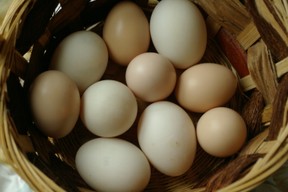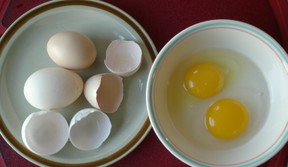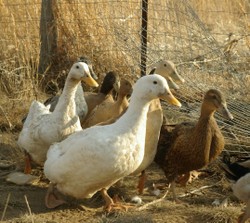
FRIED DUCK EGGS
Fry duck eggs the same way you fry chicken eggs. Some people use butter instead of cooking oil because butter takes away any gamey flavor the egg might have.
Because duck egg whites have more protein than chicken egg whites, they can become rubbery. To prevent this, fry them slowly. You can also steam-fry duck eggs; frying them about halfway done, then adding water to the pan and covering it until they are cooked through.
SCRAMBLED DUCK EGGS
You might need to beat the eggs a little more since the yolks are a little stiffer. Lightly oil a skillet or griddle and cook on low to medium heat. If you cook duck eggs at a high heat, they will lose their flavor and become chewy. You can also scramble your eggs to make an omelet using additional ingredients such as mushrooms, cheese, onions, and peppers.
This basket of eggs includes both chicken and duck eggs.

BOILED DUCK EGGS
Boiled duck eggs are a little richer than boiled chicken eggs. Because of the extra protein in the white, make sure you don't overcook them.
Boil duck eggs by placing them in a pot of cold water and bringing the water to a boil. As soon as the water boils, remove the pan from the heat and allow it to stand covered for twelve minutes for large eggs.
Drain the eggs and crack the shells slightly by shaking the pan. This lets the eggs cool faster and prevents overcooking. Cover the eggs with cold water and allow them to sit until they are completely cool before peeling them. The whites should have no greenish tint, and the yolks should appear bright yellow or even orange.
I use the same method to boil chicken eggs, only I let them sit in the water for twenty minutes rather than twelve. This is for hard-boiled, not soft-boiled.






 This photo shows a large chicken egg compared to a duck egg. There would be a bigger difference in size comparing a small or medium chicken egg.
This photo shows a large chicken egg compared to a duck egg. There would be a bigger difference in size comparing a small or medium chicken egg.




 I Loved to Read in Grade School (in the 1960s)on 09/29/2018
I Loved to Read in Grade School (in the 1960s)on 09/29/2018
 Halloween Memories from the 1960son 09/17/2018
Halloween Memories from the 1960son 09/17/2018
 What on Earth is Earthing?on 06/03/2015
What on Earth is Earthing?on 06/03/2015
 Worm Manure (Castings) Is The Best Organic Fertilizeron 05/25/2015
Worm Manure (Castings) Is The Best Organic Fertilizeron 05/25/2015



Comments
frankbeswick - thank you for the additional information on raising ducks. I live in an apartment and have never raised animals.
BarbRad - chicken, duck, and geese hens will lay eggs with no male duck around. The eggs won't be fertile, though. So it all depends on if your neighbor's duck is male or female.
I have eaten duck eggs. Their yolk is more intensely yellow than the yoke of a chicken's egg, and their white is somewhat more translucent than the white of chicken's eggs. But the taste is not very different, though just maybe a bit stronger.
You must be careful about where the ducks' eggs have been kept, as their shells are porous, and as ducks are very dirty birds likely to splash muddy water about, duck eggs left lying on the pool side can absorb mucky water.So duck keepers must pick them as soon as possible after laying and also try to provide clean spaces for the ducks to lay. Regular changes of water in the duck pond are a good idea. Pour the mucky water onto your vegetable beds, it is good fertilizer, and then replace it with clean water.
Ducks,like chickens, lay eggs that are infertile unless the hen has mated, then the eggs are fertile.It is these unfertilized eggs that we eat. The hens simply drop infertile eggs as they go along, make no nest for them and don't sit on them.
I never have eaten duck eggs. I guess they wouldn't taste much different than chicken eggs. My neighbor has a duck, but I am not sure if it lays eggs. She has only one duck, so it probably doesn't.
frankbeswick - yes, she lived out in the country. I live in an apartment in San Antonio, but in an area where there are still some wooded areas nearby. One year some screech owls (small size) nested in a hole under the eves on the top story. I got to watch them swoop out at night and bring back lizards to eat. Our city has grown so rapidly around the outer edges that we have deer and coyotes trapped inside. The deer eat peoples' flowers and bushes and the coyotes will sometimes get someone's cat.
An owl! Was she in the countryside? I have only ever seen an owl in a town once, a barn owl, though at about the same time I heard a long eared owl for a few days. Where I live the problems come from urban foxes and cats.
frankbeswick My cousin had ducks, which is how I got a chance to eat the eggs. She let her chickens and ducks roam around outdoors during the day, but wild animals would get them. She eventually had to keep them in pens. One time she was missing a chicken some mornings, but could find no physical evidence of what happened to them. After talking with neighbors, she finally figured out an owl was swooping in and grabbing them! So she couldn't let them stay outdoors at night any more.
There are different breeds of duck, some of which are bred for meat and others for prolific egg laying.
I would keep them, but if you do you have to regularly clean their pond, as they can be filthy beasts. You also need to keep them protected, not only from foxes and cats, but from the attention of free flying mallard drakes. These are utterly promiscuous and will mate anywhere they can, so several duck breeders trying for pure breeds get a surprise when they find that their duck has been visited by a mallard drake.
I ate duck eggs a few years ago, and I was surprised at how much bigger they are than chicken eggs. They look a little bit bigger, but the volume of the egg is much bigger. I.e. we made an omelette out of ONE duck egg, and it came out a pretty huge omelette, whereas I usually would use 2-3 chicken eggs.
The taste was good, very similar to a normal chicken egg.
I'd definitely eat duck eggs again. I just don't see them available often. The only downside was that it was just a tad tougher to crack...but that can be a plus, if having them break during transport is an issue.
I have eaten duck eggs, and I find them very good. The yolk is slightly darker than the yoke of a chicken's egg, but the white seems to have a lighter quality about it. Duck eggs need to come from a clean source, as if they absorb water and if they are exposed to dirty water on the edge of a pond they can be contaminated. We need to pick them quickly to keep them clean.
Sadly council regulations prevent me from keeping ducks and chickens on my allotment, but I have my eyes open for the future,if a bit of land [that's an Irish expression for you] comes available